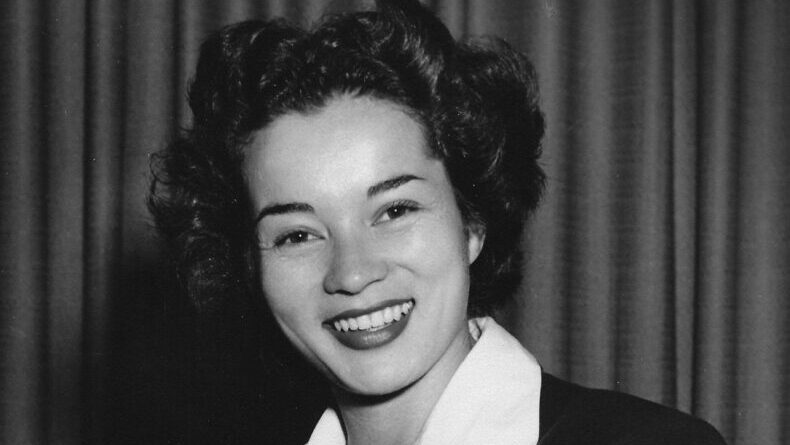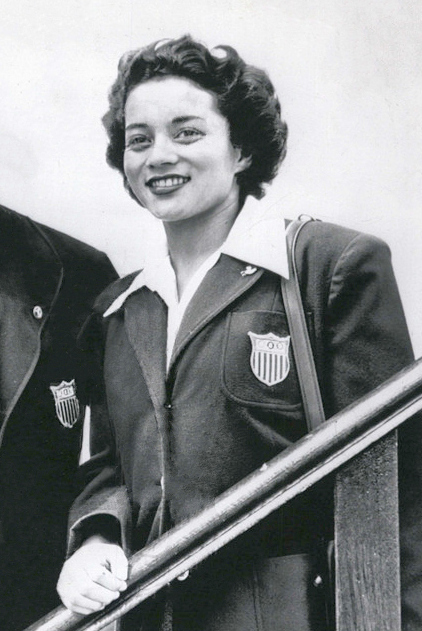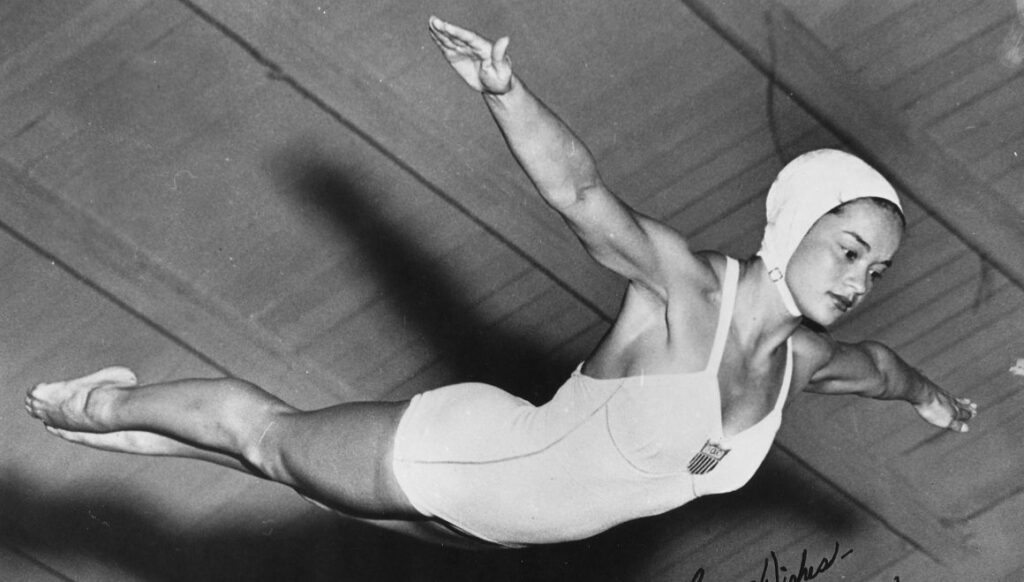
The Complete List of Vicki Draves Facts
The Diving Pioneer Who Made Olympic History

Vicki Draves was an American diver who made history at the 1948 London Olympics by becoming the first woman to win gold medals in both the 3-meter springboard and 10-meter platform events at a single Games. She was also the first Asian American to win an Olympic medal of any kind.
Quick Facts About Vicki Draves
-
Born: December 31, 1924, San Francisco, California
-
Died: April 11, 2010, Palm Springs, California
-
Claim to Fame: First woman to sweep both Olympic diving events (1948)
-
Historic First: First Asian American Olympic medalist
-
Heritage: Filipino father, English mother
-
Racial Barriers: Forced to compete under her mother’s maiden name “Taylor”
-
Segregation: Trained in pools open to people of color only once per week
-
Olympic Wins: Springboard gold by only 0.51 points; platform gold shortly after
-
Career: Performed in Buster Crabbe’s “Aqua Parade”
-
Honors: International Swimming Hall of Fame inductee; San Francisco park named in her honor
Vicki Draves didn’t just break records—she broke barriers. She faced discrimination at every turn but refused to quit. Her success shows what’s possible when talent meets resilience.
At R. Couri Hay Columns, we spotlight remarkable individuals whose achievements pushed culture forward. Vicki Draves is one of those trailblazers.
From San Francisco to Segregated Pools: Early Life and Obstacles

Vicki Draves was born Victoria Manalo in San Francisco to a Filipino father and English mother. Her mixed heritage created challenges from the start. Anti-Asian prejudice shaped daily life in the 1920s and 1940s, and the Manalo family felt it everywhere.
Money was limited, and swimming lessons were out of reach. She learned to swim at age 10 in the Mission District’s public baths. No one could guess that a little girl splashing in a nickel pool would become an Olympic champion.
Segregation made her training even harder. San Francisco’s public pools allowed people of color to enter only one day each week. Some pools even drained the water after she swam. Imagine being a teenager training for greatness in a place that treated you like a threat.
When she tried to join elite diving clubs, she was rejected because of her Filipino heritage. One club said they would allow her to train only if she used her mother’s maiden name. So she competed as “Vicki Taylor.” It was painful, but it gave her access to the coaching she needed.
These moments shaped her identity and her destiny. They also highlight how powerful a strong personal brand can be—and how often identity becomes a gateway or a barrier. (Learn more in our branding services.)
How Vicki Draves Started Her Diving Career
At 16, Vicki Draves caught the attention of coach Charlie Sava. She joined his Crystal Plunge team and soon began training under Jimmy McHugh. When McHugh left, she moved to train with Lyle Draves in Oakland. He recognized her talent immediately. They later married and formed a strong personal and professional partnership.
Under his coaching, her career soared. Between 1946 and 1948, she won four national diving titles. She became a dominant force, and the 1948 Olympics soon called.
Overcoming Racial Barriers on Her Way to the Olympics
The barriers in her path were not athletic—they were racial.
>She trained in segregated pools. She used an anglicized last name to compete. She faced humiliation that would have broken many athletes. But she kept going.
By showing up day after day, Vicki Draves challenged a system designed to hold her back. Long before she won gold, her persistence made her a champion.
The 1948 London Olympics: A Historic Double Gold
The 1948 London Olympics happened during a difficult moment in world history. Post-war rationing was still common, and the event became known as the “Austerity Games.” But for Vicki Draves, it was a life-changing moment.
She won two gold medals—one in the 3-meter springboard and another in the 10-meter platform. No woman had achieved this before. She also became the first Asian American to win an Olympic medal of any kind.
Her teammate, Korean American diver Sammy Lee, also medaled. Together, they changed the story of Asian American athletes forever.
Springboard Gold: A Close, Dramatic Victory
On August 3, 1948, Vicki Draves won gold in the 3-meter springboard by only 0.51 points. She edged out her friend and training partner Zoe Ann Olsen. The margin was tiny, but it secured her place in history.
Platform Gold: A Perfect Finish
Three days later, she won the platform event. No other swimmer or diver—male or female—won two individual golds at those Games. Her performance sealed her legacy as a diving icon.
Life After the Olympics and Lasting Legacy
After the Olympics, Vicki Draves turned professional. She performed in Buster Crabbe’s popular “Aqua Parade,” touring the U.S. and Europe. Crowds loved her. The same water spaces that once excluded her now highlighted her talent.
Later, she and her husband opened a diving and swimming school. They trained young athletes and helped make the sport more inclusive.
Vicki Draves passed away in 2010 at age 85. But her legacy grew even stronger.
-
Inducted into the International Swimming Hall of Fame (1969)
-
San Francisco opened Victoria Manalo Draves Park (2005)
-
Google honored her with a Google Doodle on her 95th birthday (2020)
Her story continues to inspire athletes, Asian American communities, and anyone who faces barriers.
At R. Couri Hay Columns, we honor cultural innovators and historic pioneers. Vicki Draves represents the best of America’s resilience and spirit. If you want to shape your own legacy, explore our strategic planning services.
Frequently Asked Questions About Vicki Draves
Was Vicki Draves the first Asian American to win an Olympic gold medal?
Yes. Vicki Draves was the first Asian American to win an Olympic gold medal and the first to win any Olympic medal at all. Her victories in 1948 opened doors for future generations.
Why did Vicki Draves compete under the name “Taylor”?
She used her mother’s maiden name to avoid racial discrimination. Many elite diving clubs refused to accept Filipino American athletes. By competing as “Vicki Taylor,” she gained the access she needed to train.
What two events did Vicki Draves win at the 1948 Olympics?
She won gold in the 3-meter springboard and the 10-meter platform. Her sweep made her the first woman to win both events at the same Olympics.
Conclusion
Vicki Draves overcame poverty, discrimination, and segregation to become one of the greatest divers in history. Her victories changed what was possible for Asian American athletes and women in sports. Her story continues to inspire people from San Francisco to New York City and beyond.
At R. Couri Hay Columns, we celebrate stories like hers—stories of courage, determination, and the power of narrative to change minds and shape culture. If you want help crafting a story or legacy of your own, explore our strategic services.

